
archives for 11/2018
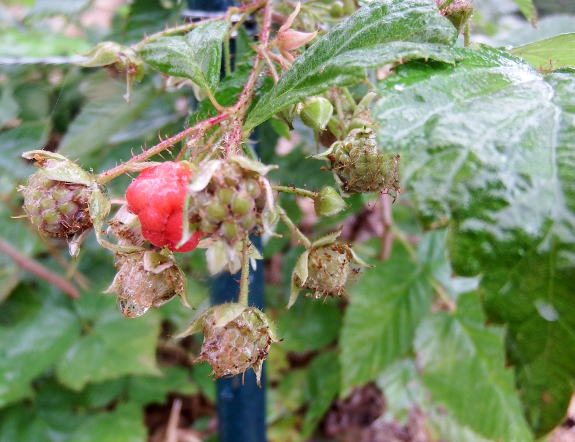
Prelude raspberry is
marketed as an ultra-early-ripening red raspberry (thus the name). But
the variety is actually an everbearer that can give you a second crop
in very late autumn if your growing season is long enough.
Sure enough, of the five
Prelude plants we popped into the ground seven months ago, one flowered
and is steadily working toward ripening its fruit. Given that we've had
several spotty frosts plus one that blanked the entire farm, however, I
don't hold out much hope we'll get to eat more than that single,
nearly-ready fruit this year.
But we'll certainly be
glad of the planting in June 2019!
We spotted this baby toad in a jar by the Uptown Athens Ohio parking garage.

I set the camera up in
time-lapse mode while I started putting the garden to bed. And in the
process, I came to two conclusions....
Conclusion one: sowing
an oat cover crop beneath ailing summer crops
in mid August sure makes this task more inspiring. I'm not just pulling
out the dead, I'm making way for homegrown organic matter in the spring!

Conclusion two: Mark was right. I managed to pull out one
tomato stake, but the others are so deeply embedded in the clay subsoil
that they might as well have been set in concrete. Are we really going
to have to buy a post puller for five measly stakes?
Our spinach crop is a little
bare this year.
Some things to do next time
will be to increase nitrogen and loosen the soil 12 inches deep to help
the tap root get established.
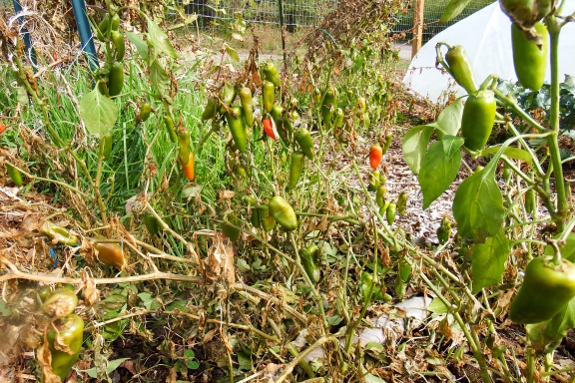
I go back and forth
about what to do with late-ripening peppers. Mark and I vastly prefer
sweet, red peppers over their immature green form. But if you pick all
of the green peppers before the first frost, many shrivel-ripen, not
quite tasting as good as they would have if simply eaten green.
This year, with light,
spotty frosts on the horizon in early October, I decided to be a
gambler and only pick the fruits that were at least partially ripe.
Sure enough, the plants were only lightly nipped and fruits continued
ripening, giving me two more harvests to date. Success!
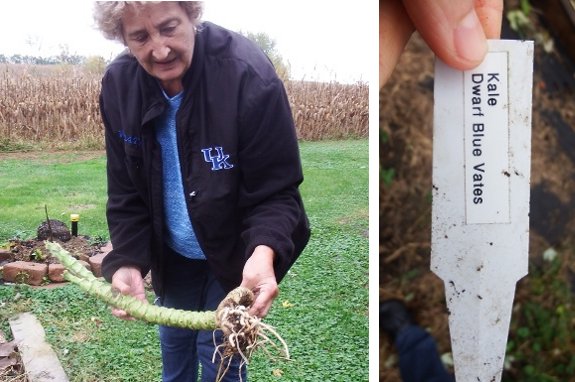
My Mom tried Dwarf Blue Vates
kale this year.
Anna noticed that it did not
go to seed, so she pulled it out of the chicken coop and replanted it
to see if it will come back next year.
Some perennial kale can live up to 5 or 6 years.
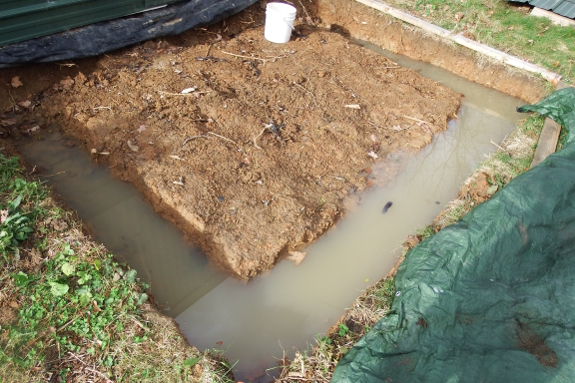
We were almost done with the digging...then it set in to rain. An inch and three quarters later, we didn't have an excavation project, we had a moat.
At first, Mark and I were just going to wait for the water to soak into the soil. But we seem to be on an every-other-day rain schedule at the moment and I'm not a very patient person. So Mark dug out a sump pump. Stay tuned to see if it works!
The submersible pump does a good job at draining the water from our foundation.
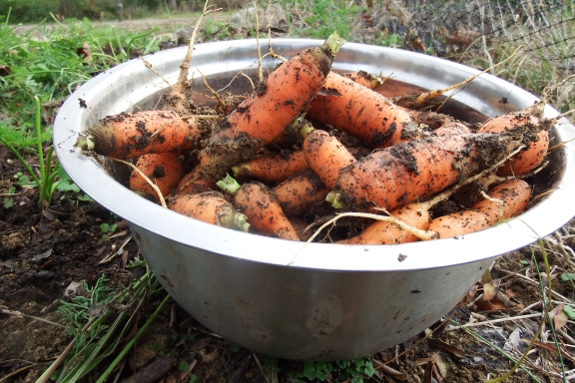
With some care, it's
quite possible to over-winter carrots. But I've found the flavor is
best if you instead harvest them after the weather has turned cold but
before the ground has started to freeze.
I've been pulling the biggest carrots here and there for a couple of
months now, but Wednesday I decided it was time to take the rest out of
the ground.
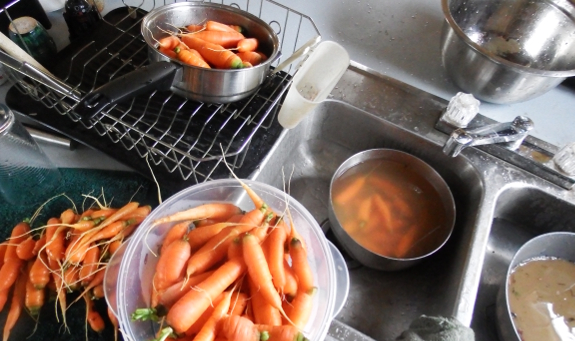
I planted an area about
a quarter as large as I used to back in Virginia, which meant it only
took about half an hour to clean them all up. An assembly line made the
process more efficient, adding to the fast work.
I scrubbed in the filthy
bowl to the right, rinsed in the cleaner water in the middle, then let
the carrots drip dry in the steamer on the upper left while I processed
another batch. The carrots on the towel are either small or injured in
some matter --- I'll eat those quickly. Then I ended up with two big
covered bowls to store in the fridge for winter meals.
I almost forgot to run the Honda mower dry before she goes into Winter hibernation.
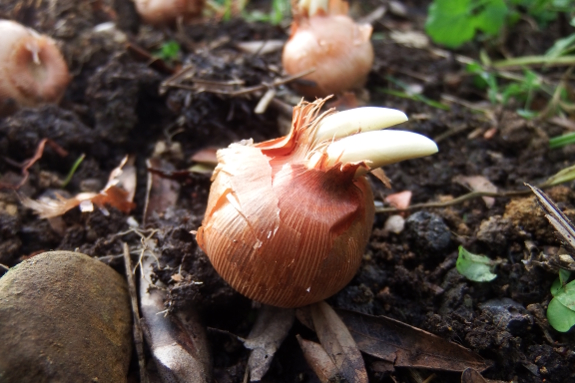
The biggest reason I
rushed to harvest
my carrots is because I had that spot earmarked to turn into a
flower bed. Two bags of crocuses have been waiting for months to go
into the ground there. So as soon as the carrots came out, the crocuses
went in.
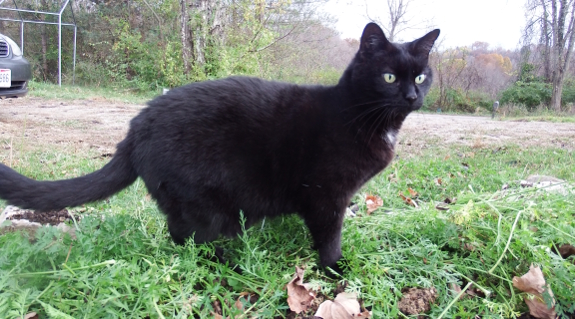
Huckleberry "helped"
with the project, which means he sat on the carrot tops and made it
difficult to use them as mulch over my crocus bulbs. I eventually got
the job done anyway.
Well, except for
deciding what else to plant in my new flower bed for summer and fall
color. Ideas for useful or at least low-work perennials to plant in a
very deer-trafficked spot?
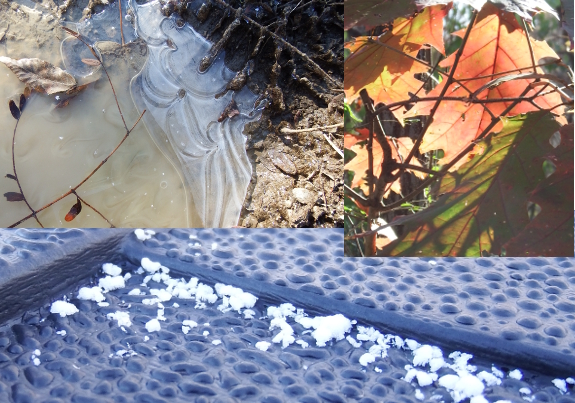
Fall flirted with us for
three glorious weeks. Then the barely-almost frosts disappeared with
multiple nights in the 20s --- our first hard freeze.
The last green peppers
escaped me but I picked broccoli side shoots frozen solid and cooked
them before they thawed. Now we're down to lettuce, kale, and
(possibly) brussels sprouts harvests out of the garden for the rest of
the winter. But that's alright --- I'm looking forward to snow!
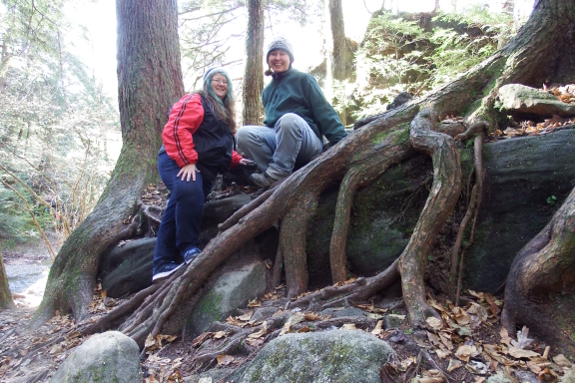
Jenn and I celebrated
our one-year friendiversary with a visit to Old Man's Cave.
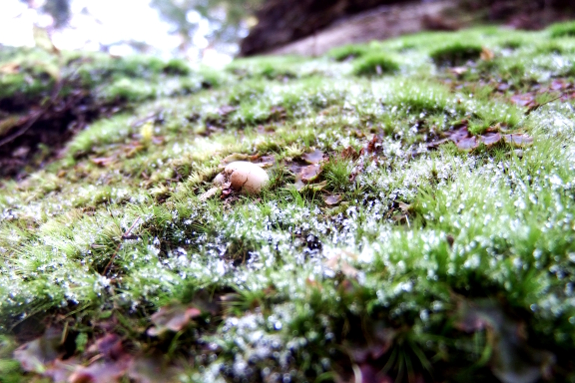
Well, okay, I'll be
honest. I meandered so much peering at mosses and liverworts, rocks and
roots and rushing water that we didn't make it to the cave in question.
But we saw just about everything else...so I supposed that oversight is
just an excuse to go back!
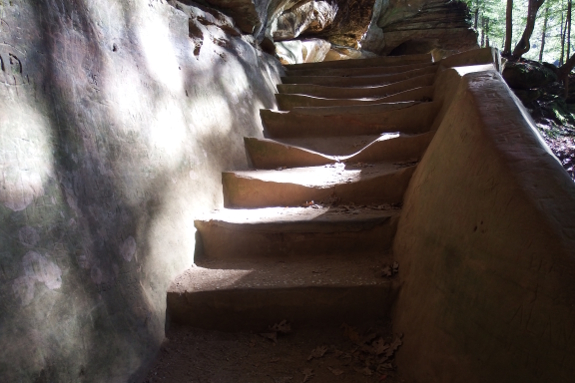
Despite temperatures
hovering around freezing, the park was crowded with sightseeers. To me,
this staircase says it all --- so many people have trod here that the
standstone steps have worn away. (The flat ones have been replaced with
concrete.)
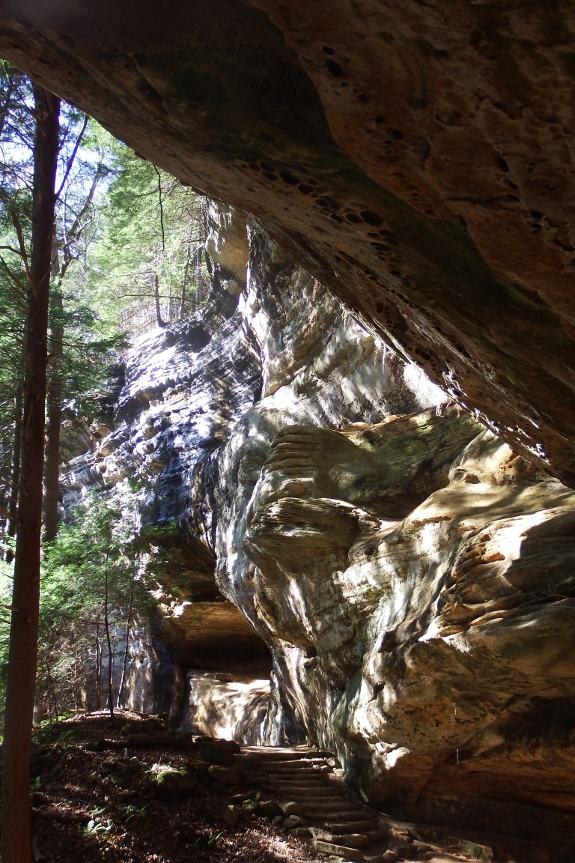
There was still plenty
of beauty despite the crowds though. This shot almost captures the
grandeur of the rock formations...but not quite.
We celebrated National Recycling Day by taking a tour of the local recycling facility.
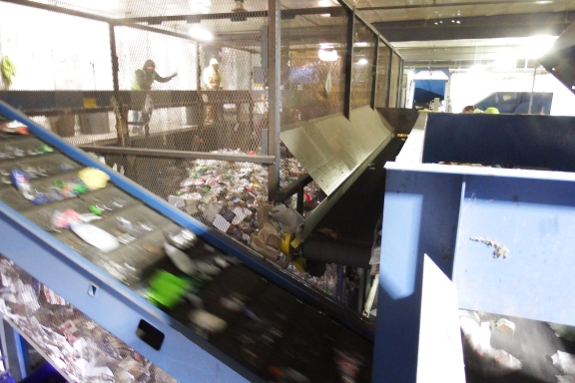
In addition to being
wowed by the combination mechanical and human-operated sorting system,
the biggest takeaway from our
tour of the local recycling facility was what was best not tossed
in the recycling bin.
Our tour guide prefaced
his warnings with the statement that every recycling facility is
different. And single-stream facilities like theirs (where you deposit
all of the recyclables in a single container) are more particular than
ones where the consumer sorts their own trash.
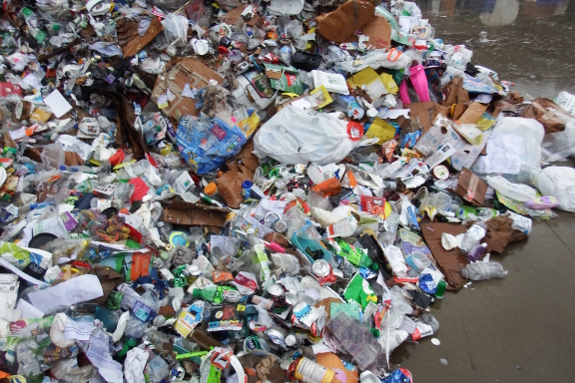
With those caveats out
of the way, here's what I shouldn't have been recycling:
Don't bag your
recyclables because the line workers will have to tear the bag apart
before the machines can start sorting. And, whatever you do, don't put
your recyclables in a black bag --- they workers will assume it's trash
and throw it out for safety reasons.
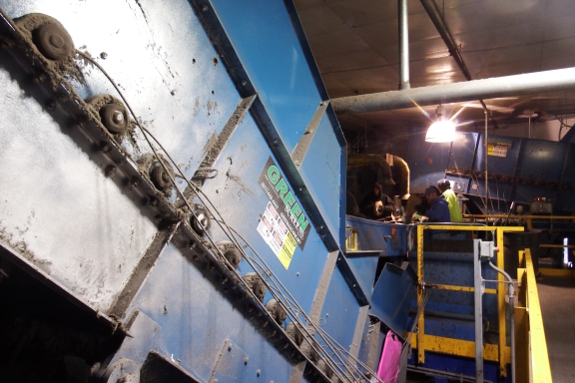
Anything smaller than a
business card tends to get lost in the shuffle. That means shredded
paper is a no-no. Plastic bottles should be crushed then the cap should
be screwed back on.
Similarly, heavy scrap
metal just doesn't work on the assembly line. Our guide told us about
the metal from a ratchet strap that got caught in the line and messed
up a $40,000 motor. Yikes!
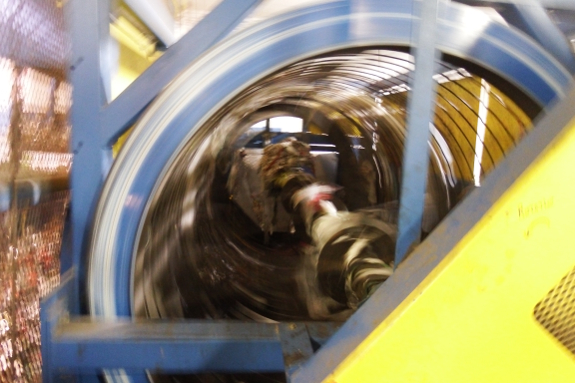
Tanglers are also
trouble. That's anything like string, cords, or rope that will wind
around various materials (and parts of the assembly line), clogging up
the works.
Finally, don't stuff
different types of recyclables inside each other (like filling up
cardboard boxes with plastic bottles). The materials won't get
separated properly and will result in contamination in the finished
product.
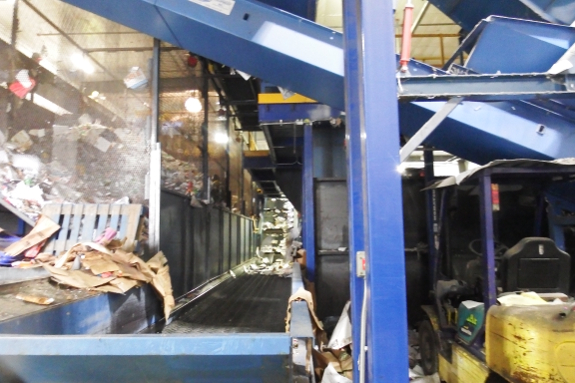
All of that said, a
non-profit like our local recycling and trash pickup facility manages
to salvage 91% of the materials that go on the assembly line, finding
buyers despite the fact China no longer wants our waste. Great work,
Athens-Hocking Recycling!
(And one final piece of
fun trivia --- did you know Mark wanted to be a garbageman when he was
a kid?)
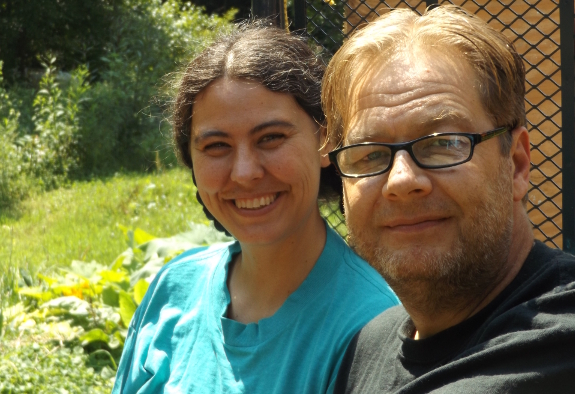
Anna and I talked about the
future of the Walden Effect blog this weekend and have decided to take
a blogging vacation to
to decide if we have enough homesteading activities going on to keep
the blog alive.
If you want to be alerted to any random posts we may write in the interim, please scroll down the bottom of the sidebar and sign up for email alerts. Thanks for reading along!
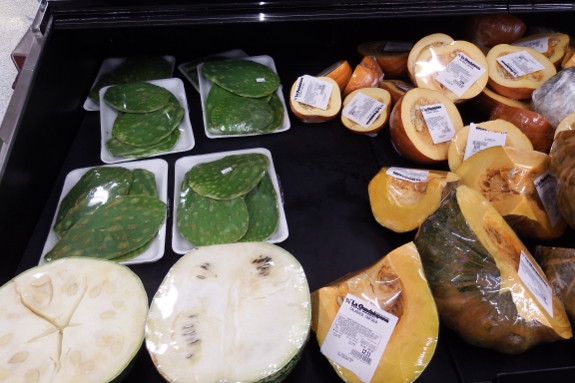
Mark and I are enjoying
our blogging vacation...and yet, I couldn't resist sharing some
intriguing, store-bought fruits with you!
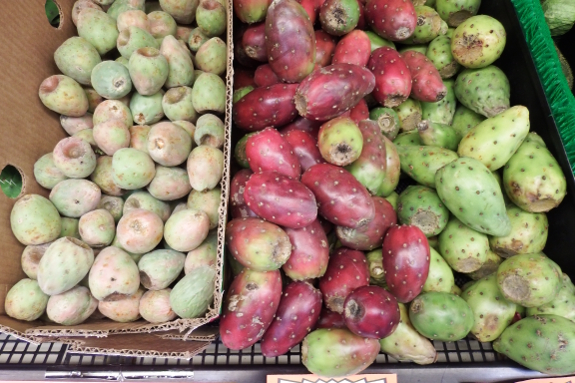
We got to explore a
Hispanic grocery store on Black Friday, and I of course gravitated
directly toward the produce department. I didn't try any of the cactus
leaves that were available in several different forms, but I did sample
one of three kinds of cactus fruits.
After some research at
home, I'm pretty sure all three of the fruits pictured above are from
prickly pear cacti, which grow wild in Mexico but also in plantations.
There are hundreds of varieties out there, so even though I wasn't a big
fan of the one I tasted (the red one in the middle), I clearly need to
try this fruit again. The seeds are large and I spat them out, not
knowing they were edible. The taste of the one I ate (perhaps a
cordana?) was very similar to that of an unripe banana.
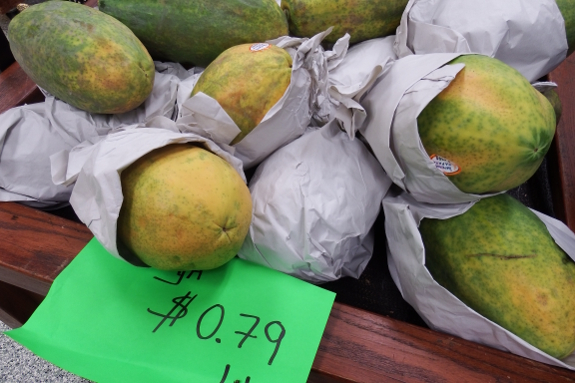
Much tastier, in my
opinion, were the papayas. I was spoiled on papayas by eating them for
four months in Costa Rica, and I've turned up my nose at grocery-store
papayas ever since. But the ones in the Hispanic grocery were big and
delicious (although my fellow taste testers were less impressed,
suggesting papaya may be an acquired taste).
I hope you all had a
wonderful Thanksgiving and a Black Friday as inspiring as ours!
Want more in-depth information? Browse through our books.
Or explore more posts by date or by subject.
About us: Anna Hess and Mark Hamilton spent over a decade living self-sufficiently in the mountains of Virginia before moving north to start over from scratch in the foothills of Ohio. They've experimented with permaculture, no-till gardening, trailersteading, home-based microbusinesses and much more, writing about their adventures in both blogs and books.
